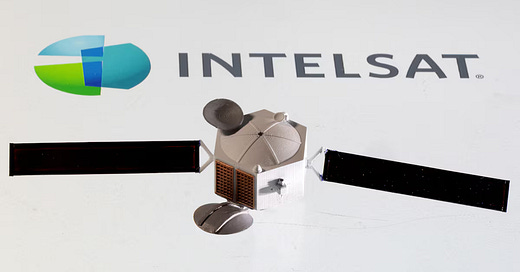European Commission, UK Approve SES-Intelsat Deal Without Conditions
Two satellite industry leaders are about to form a European competitor to Starlink. However, they will face significant challenges in competing with Elon Musk’s firm.
The European Commission has approved Luxembourg-based SES’s $3.1 billion acquisition of Intelsat, concluding it doesn't raise competition concerns in the EEA. After investigating the market, the EC found credible competitors in both media broadcast satellite services and two-way services for aviation, maritime, and government markets. Fiber and LEO operators will constrain the combined entity's market power.
SES and Intelsat stated the merger is needed to give the company better competitive scale. The EC also stated that the merged entity would not restrict access to its satellite capacity.
The UK’s Competition and Markets Authority (CMA) also approved the acquisition, noting significant competitive pressure in the in-flight connectivity market. These approvals come amid increasing competition from SpaceX’s Starlink and Amazon’s Kuiper constellations.
SES CEO Adel Al-Saleh expects the acquisition to complete in the second half of 2025, pending approval by the FCC and Department of Justice.
SES first announced its plans to acquire Luxembourgish-American rival Intelsat in April 2024, describing it as a transformational merger that could reshape the satellite internet market.
The merged company would possess a fleet of over 100 geostationary satellites and 26 medium Earth orbit satellites. Intelsat will contribute 75 of these satellites, which provide various services, including television, radio, satellite internet, and secure communications for governments and militaries.
An SES-Intelsat merger would result in Europe’s second-largest satellite internet provider, following the Franco-British company Eutelsat. Smaller competitors include the UK’s Inmarsat and Spain’s Hisdesat.
Combined, Europe's satellite firms could offer much-needed alternatives to Musk's Starlink or Amazon's Project Kuiper at a time when tech sovereignty is a prominent political issue.
European leaders have growing concerns about dependency on Starlink. These concerns have been heightened by reports that U.S. officials threatened to disconnect the system in Ukraine if the country did not comply with their demands regarding its mineral wealth.
This situation raised doubts about the security implications for Ukraine—and broader Europe—of relying on a single, privately-owned network led by an individual with direct connections to the Trump administration. Eutelsat, SES, Inmarsat, and Hisdesat reportedly entered discussions with EU governments in March to provide backup connectivity to Ukraine.
Despite the SES-Intelsat merger creating a more powerful European entity, the new alliance will still face substantial challenges against Starlink’s dominance.
Musk’s firm far exceeds its competitors in satellite numbers, with over 7,000 in low-Earth orbit (LEO), whereas its nearest rival, Eutelsat, has around 600. Meanwhile, Amazon’s Project Kuiper plans to deploy a constellation of 3,236 satellites.
Being part of SpaceX provides Starlink with direct access to satellite manufacturing and launch capabilities. In contrast, SES and Intelsat depend on third-party launch providers and currently lack a proprietary low-Earth orbit network. While Intelsat has a $250 million agreement to utilize Eutelsat’s LEO capacity, this reliance on external constellations places the merged entity at a disadvantage.
Even when combined with Europe’s other players, including Eutelsat, Inmarsat, and Hisdesat, the proposed merger falls short in comparison. As European policymakers advocate for strategic autonomy in space, the SES-Intelsat merger may be a step in the right direction, but it remains far from being a true rival to Starlink.
SES CEO Adel Al-Saleh informed investors at the end of April that the acquisition is expected to be finalized in the second half of 2025. The transaction is still subject to approval from the Federal Communications Commission (FCC) and the Department of Justice in the United States.



